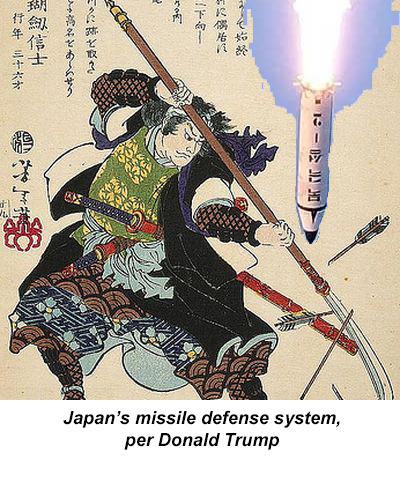After a few hours of hmming and hawing and shuffling of feet, the DNC’s Tony Perez came out with the story that of course the DNC had a joint fundraising agreement with Clinton, but Brazile was confusing the pre-nomination agreement from September 2015 with the post-nomination agreement in 2016. So there’s nothing to see here; move along.
This would seem to be a legitimate argument, since joint fundraising agreements that give the nominee considerable control over the DNC have been common for a long time. For nominees. Not candidates before the nomination is settled.
Late yesterday NPR.org came out with a story that there was an additional agreement Perez hadn’t mentioned.
In a letter to DNC members, Chairman Tom Perez noted that the party reached joint fundraising agreements with both Clinton and Vermont Sen. Bernie Sanders. “The joint fundraising agreements were the same for each campaign except for the treasurer, and our understanding was that the DNC offered all of the presidential campaigns the opportunity to set up a [joint fundraising agreement] and work with the DNC to coordinate on how those funds were used to best prepare for the general election.”
That may be true — but two Democratic officials tell NPR that Brazile and Perez are referring to two different things. In addition to that joint fundraising agreement the DNC reached with both campaigns, the party and the Clinton campaign struck that separate memorandum of understanding giving the campaign staffing and policy oversight.
That document was signed on Aug. 26, 2015 — before, among other things, Vice President Joe Biden ruled out a run for president.
The DNC has not denied this characterization or timeline.
But for now, let’s put aside questions of who signed what, and when. There is one big, fat, irrefutable fact that Clinton supporters refuse to face but cannot deny, which is this:
The joint fundraising agreement entered into by the Clinton campaign, the DNC and 33 states in 2015 made the DNC financially dependent on the Clinton campaign. And this provided a powerful incentive for the DNC to be sure that Clinton won the nomination and continued her campaign to the general election. If Sanders had won, the money spigot would have been turned off.
As has now been thoroughly reported, the DNC was broke in 2015. It was also broke in 2014 and 2013. This was not Clinton’s fault; news stories have blamed President Obama and Debbie Wasserman Schultz. But however it happened, it was broke. And the only solution to the DNC’s money problems that presented itself was the Hillary Victory Fund. So, even though the various agreements released so far have suggested that the DNC pledged to remain impartial during the primaries, they obviously were hugely motivated to not be so impartial.
Now, the next comment is bound to be, but Sanders could have raised money for the DNC and the states, too! But he really couldn’t, and now I will explain why.
Here’s now the Clinton setup worked: The Hillary Victory Fund was a joint fundraising agreement set up with the Clinton campaign, the Democratic National Committee and the Democratic parties of 33 states. It was not exactly a PAC, but something like a PAC. Individual donors could give up to $356,100 per year, and since this was set up in 2015 some gave this maximum for two years, for a total of $712,200. Of course, a lot of donations were smaller.
The fund was controlled by a committee jointly staffed by the Clinton campaign and the DNC. Its treasurer was Clinton’s chief operating officer. However, there were legal restrictions on what the committee did with the money; election finance rules don’t allow campaigns to accept that much money and use it any way it wants. Kenneth Vogel and Isaac Arnsdorf reported for Politico in May 2016:
The venture, the Hillary Victory Fund, is a so-called joint fundraising committee comprised of Clinton’s presidential campaign, the Democratic National Committee and 32 state party committees. The setup allows Clinton to solicit checks of $350,000 or more from her super-rich supporters at extravagant fundraisers including a dinner at George Clooney’s house and a concert at Radio City Music Hall featuring Katy Perry and Elton John.
The victory fund has transferred $3.8 million to the state parties, but almost all of that cash ($3.3 million, or 88 percent) was quickly transferred to the DNC, usually within a day or two, by the Clinton staffer who controls the committee, POLITICO’s analysis of the FEC records found.
By contrast, the victory fund has transferred $15.4 million to Clinton’s campaign and $5.7 million to the DNC, which will work closely with Clinton’s campaign if and when she becomes the party’s nominee. And most of the $23.3 million spent directly by the victory fund has gone toward expenses that appear to have directly benefited Clinton’s campaign, including $2.8 million for “salary and overhead” and $8.6 million for web advertising that mostly looks indistinguishable from Clinton campaign ads and that has helped Clinton build a network of small donors who will be critical in a general election expected to cost each side well in excess of $1 billion.
Per reporting by Politico, the HVF committee was depositing big checks from fundraisers into state Democratic Party bank accounts, but then taking the money out again, usually the same day. This appears to have been a way to legally “launder” the money so that Clinton could take the equivalent of an individual contribution — $2700 for the primaries, and another $2700 for the general, off the top. Then the money was passed on to the DNC. which was entitled to $33,400 per donation, and eventually, for the general election, remaining monies were released to states. And this is completely legal, by the way.
But here’s the catch, as far as Sanders is concerned. Campaign finance reform was one of his signature issues, and he was working hard to accept only individual contributions. As a primary candidate, he was accepting only $2700 per person per donation. And no more. (When FEC records showed some of his donors had exceeded this amount, he was obliged to give the extra money back.)
So how was Sanders supposed to compete with Clinton without betraying his own principles? He couldn’t. Those of you saying that it was just Sanders’s personal choice to not raise money for down-ticket candidates can kiss my ass.
Politico reported in May, 2016:
The arrangement has sparked concerns among campaign finance watchdogs and allies of Clinton’s Democratic rival Bernie Sanders. They see it as a circumvention of campaign contribution limits by a national party apparatus intent on doing whatever it takes to help Clinton defeat Sanders during the party’s primary, and then win the White House.
But it is perhaps more notable that the arrangement has prompted concerns among some participating state party officials and their allies. They grumble privately that Clinton is merely using them to subsidize her own operation, while her allies overstate her support for their parties and knock Sanders for not doing enough to help the party.
 At that point, the article says, states were only allowed to keep about 1 percent of the funds being raised. Again, more would be kicked in for the general elections;
see Open Secrets for what I assume are the final totals. But Clinton herself benefited from the HVF more than any of the states, so it wasn’t exactly an exercise in selfless altruism.
Further — and this is a significant point — there is no question that a significant amount of the money that went to the DNC during the primaries was being spent on behalf of the Clinton campaign, to the detriment of the Sanders campaign. Remember, even after the money allegedly had been passed on to the DNC, Clinton’s own chief operating officer was heading the committee controlling it.

Ad soliciting donations for the HIllary Victory Fund.
The financial disclosure reports on file with the Federal Election Commission indicate that the joint committee invested millions in low-dollar, online fundraising and advertising that solely benefits the Clinton campaign. The Sanders campaign “is particularly concerned that these extremely large-dollar individual contributions have been used by the Hillary Victory Fund to pay for more than $7.8 million in direct mail efforts and over $8.6 million in online advertising” according to the letter to the DNC. Both outlays benefit the Clinton presidential campaign “by generating low-dollar contributions that flow only to HFA [Hillary for America] rather than to the DNC or any of the participating state party committees.”
The questionable outlays “have grown to staggering magnitudes” and “can no longer be ignored,” Deutsch added.
The expenditures on advertising and fundraising are at best “an impermissible in-kind contribution from the DNC and the participating state party committees” to Clinton’s presidential campaign, the letter said. “At worst, using funds received from large-dollar donors who have already contributed the $2,700 maximum to HFA [Hillary for America] may represent an excessive contribution to HFA from these individuals.”
In addition, the joint committee has paid the Clinton campaign committee $2.6 million ostensibly to “reimburse” the Clinton presidential campaign staff for time spent running the joint committee. The unusual arrangement, Deutsch said, “raises equally serious concerns that joint committee funds, which are meant to be allocated proportionally among the participating committees, are being used to impermissibly subsidize HFA through an over-reimbursement for campaign staffers and resources.”
“While the use of joint fundraising agreements has existed for some time … it is unprecedented for the DNC to allow a joint committee to be exploited to the benefit of one candidate in the midst of a contested nominating contest,” said Jeff Weaver, Sanders’ campaign manager.
To read the letter, click here.
These issues were never properly addressed. Basically, the Democratic Party and mainstream media, including “liberal” media, told the Sanders campaign to shut up.
Today, Clinton sycophants are merrily telling themselves that Donna Brazile’s claims have all been “debunked,” allowing them to continue to stroll merrily along with their heads up their asses. Even if they are dimly aware that the HVF wasn’t being entirely fair, that’s okay, because Sanders wasn’t a real Democrat.
However, Martin O’Malley was a real Democrat, and when he complained about the debate schedule being rigged to help Clinton, he was ignored. And what about all the other Democrats who might have tried for the nomination, but were discouraged, because Clinton had the money brokers tied up by early in 2015?
As I have written elsewhere, I don’t want this issue to turn into further debates over whether Sanders was cheated out of the nomination. Sanders might have come up short anyway. I just want the DNC to come clean about what actually happened last year. It needs to acknowledge that the joint fundraising agreement amounted to Clinton’s buying the DNC. It depended on her campaign for operating money, which gave the DNC a powerful incentive to be sure she won the nomination. I think that is beyond dispute. It’s vitally important for the DNC to come clean about this, and for something like this to not happen again.



